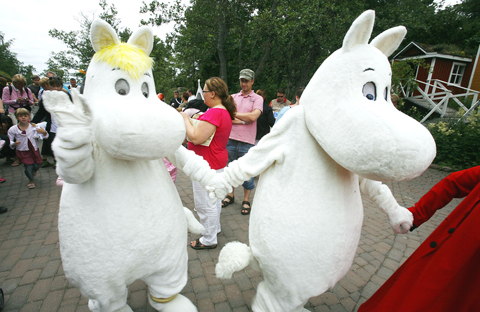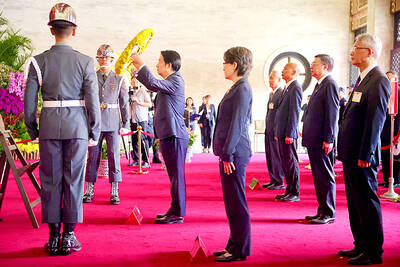In one of the quirkiest book cults the US has never heard of, a round-snouted troll is hauling consumers’ wallets from their pockets despite the worst recession in decades.
The license-holders for Moomin, who say license sales increased 35 percent this year, are contemplating expansion.
“We want to grow and be as profitable as we have been so far, but in a way that increases the awareness of Moomin, starting from countries where books already are sold,” Sophia Jansson said.

PHOTO: REUTERS
The artistic head and chairman of Moomin Characters, she is the niece of Finnish author and illustrator Tove Jansson, whose creation, the Moomintrolls, soon turn 65.
Moomins — whose naive hero Moomintroll was the “nastiest creature” teenage Tove Jansson could imagine after a quarrel with her brother — are a lucrative publishing and licensing niche mostly in Nordic countries, Japan and Britain.
Since the 1945 publication of The Moomins and the Great Flood, adventures with Moomin and parents Moominmamma and Moominpappa have featured in 13 novels and picture books translated into 40 languages, and thousands of cartoon strips.
The characters have also been used to brand a wide range of products, including kitchenware, diapers, DVDs and tinned candy.
“They made me feel peaceful,” said Tokyo-based Hideyuki Masumoto, 40, describing the characters he called his childhood friends, while eyeing gifts in the tiny Moomin shop in Helsinki. “They remind us of how we used to live in Japan — in a small community where everyone knows each other.”
In Japan, children in the 1960s grew up with an animated television series of the trolls and loved Moomin, Masumoto said. His personal hero was Moomin’s friend the wayfarer Snufkin, the “wise guy, who plays music and doesn’t belong anywhere.”
Inhabiting a land called Moominvalley, Moomins play into a similar vein of comfort to Disney’s Winnie-the-Pooh, revived by publishers Egmont in an Oct. 5 sequel, but the deeply Finnish characters tap much darker mysteries than Pooh.
Bjorn Lindergaard, 30, a Dane in Helsinki on UN training, said he liked that the tales were inventive and realistic, and none of the characters were perfect. For example Little My, a tin-sized, fierce girl, with a positively aggressive temper.
“The Moominvalley looked very friendly, but there was also a darker side to it. Life was not just plain idyllic,” he said.
Peaceful and realistic is how people see Moomins, but they are not human, said Sophia Jansson, whose firm manages the Moomintroll legacy and copyrights including up to 300 licensees.
“The Moomins are not people. You can’t send them up the Eiffel Tower, they don’t speak on cellphones, drive cars, or carry guns,” she said.
Moomin Characters chief executive Roleff Krakstrom said he is eyeing the US market. Moomin books were sold there half a century ago, but the firm has no licensees and animations have aired only on Hawaii.
He is cautious, however.
“It is possible, but not obligatory,” Krakstrom said. “We are reluctant to start a big project that could fail and label Moomin for a long time.”
Last year, Moomin Characters, which was founded by Tove Jansson and her brother and co-illustrator Lars Jansson, collected US$6.69 million in license income and sales from its three brand shops in Helsinki, with operating profit at US$2.18 million.
“Some think Moomin is only for the smallest family members, but for instance in Japan, our main target group is 20 to 35-year-old women,” Sophia Jansson said.
Products for adults make up half the firm’s sales.
Technologies such as digital media are helping characters cross borders, said Marty Brochstein, senior vice president of the international Licensing Industry Merchandisers’ Association (LIMA), but she warned that cultural characteristics were important.
In Japan, Moomin plays into a long-running craze for cute things, said Roger Berman, managing director of the Japanese branch of LIMA. It was a similar story to many characters seen in the West as targeting children, such as Peter Rabbit by Beatrix Potter or The Very Hungry Caterpillar by Eric Carle.
“If it looks cute, Japanese adults will buy as much as a child will. They will happily display character hang straps from their mobile phones without self-consciousness,” Brochstein said.
Martin Olausson, digital media director at Strategy Analytics, pointed out, however, that with Disney recently agreeing to buy Marvel’s superheroes, the consolidating industry is tending to focus on established characters to minimize risk, rather than introduce new ones.
“Profitability depends on how strong the brand is,” Olausson said. “There is a very wide spectrum, but firms like Marvel, with a library of globally big characters, can charge a lot.”
In North America, character royalties slid 3.9 percent to US$2.6 billion last year. Giants like Disney and Marvel have suffered as consumers reined in purchases.
The Moomintrolls — curious, bohemian, generous — may be a bit more edgy and eccentric than the US mainstream.
Moomintroll is friendly and wide-eyed. He picks flowers and likes to fish. Besides Little My, who plays pranks, his friends are oddball. Snufkin smokes a pipe.
Where Pooh’s Hundred Acre Wood has Eeyore the grumpy donkey, Moominvalley has a melancholy scientist, the Hemulen. A hill-shaped, lethal spook called the Groke invokes all winter’s pain. Even the comedy Hattifatteners — finger-shaped electric creatures which move in a flock — are unsettling.
Tove Jansson, who died in 2001, said her own experiences were the basis for her work and the experience of war may be one distinguishing factor making Europeans and Japanese susceptible to her sense of shyness and feelings of disaster.
Some experts, like Chris Anderson, author of The Long Tail, have said technology now allows firms to cater to increasingly fragmented audiences, boosting niche products.
Olausson, however, while not ruling out that Moomins could catch on, said there was little evidence to show a niche product could thrive in the profit-driven US market without the backup of a big player.
Lana Castleman, managing editor of Canadian trade magazine KidScreen, was also cautious about the chances of success for Moomins in a market that has traditionally favored princesses and spidermen above new characters.
“It’s a completely different mindset,” Castleman said. “They [Moomins] are very different from current and historical American characters, such as Mickey and Winnie, both in the way they look and content of the stories.”

RESPONSE: The transit sends a message that China’s alignment with other countries would not deter the West from defending freedom of navigation, an academic said Canadian frigate the Ville de Quebec and Australian guided-missile destroyer the Brisbane transited the Taiwan Strait yesterday morning, the first time the two nations have conducted a joint freedom of navigation operation. The Canadian and Australian militaries did not immediately respond to requests for comment. The Ministry of National Defense declined to confirm the passage, saying only that Taiwan’s armed forces had deployed surveillance and reconnaissance assets, along with warships and combat aircraft, to safeguard security across the Strait. The two vessels were observed transiting northward along the eastern side of the Taiwan Strait’s median line, with Japan being their most likely destination,

‘NOT ALONE’: A Taiwan Strait war would disrupt global trade routes, and could spark a worldwide crisis, so a powerful US presence is needed as a deterrence, a US senator said US Senator Deb Fischer on Thursday urged her colleagues in the US Congress to deepen Washington’s cooperation with Taiwan and other Indo-Pacific partners to contain the global security threat from China. Fischer and other lawmakers recently returned from an official trip to the Indo-Pacific region, where they toured US military bases in Hawaii and Guam, and visited leaders, including President William Lai (賴清德). The trip underscored the reality that the world is undergoing turmoil, and maintaining a free and open Indo-Pacific region is crucial to the security interests of the US and its partners, she said. Her visit to Taiwan demonstrated ways the

GLOBAL ISSUE: If China annexes Taiwan, ‘it will not stop its expansion there, as it only becomes stronger and has more force to expand further,’ the president said China’s military and diplomatic expansion is not a sole issue for Taiwan, but one that risks world peace, President William Lai (賴清德) said yesterday, adding that Taiwan would stand with the alliance of democratic countries to preserve peace through deterrence. Lai made the remark in an exclusive interview with the Chinese-language Liberty Times (sister paper of the Taipei Times). “China is strategically pushing forward to change the international order,” Lai said, adding that China established the Asia Infrastructure Investment Bank, launched the Belt and Road Initiative, and pushed for yuan internationalization, because it wants to replace the democratic rules-based international

WAR’S END ANNIVERSARY: ‘Taiwan does not believe in commemorating peace by holding guns,’ the president said on social media after attending a morning ceremony Countries should uphold peace, and promote freedom and democracy, President William Lai (賴清德) said yesterday as Taiwan marked 80 years since the end of World War II and the Second Sino-Japanese War. Lai, Vice President Hsiao Bi-khim (蕭美琴) and other top officials in the morning attended a ceremony at the National Revolutionary Martyrs’ Shrine in Taipei’s Zhongshan District (中山) to honor those who sacrificed their lives in major battles. “Taiwanese are peace-loving. Taiwan does not believe in commemorating peace by holding guns,” Lai wrote on Facebook afterward, apparently to highlight the contrast with the military parade in Beijing marking the same anniversary. “We